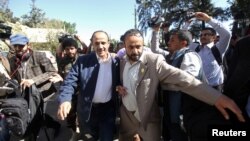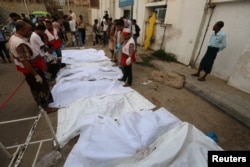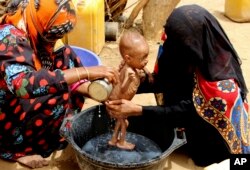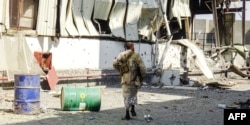After previous false starts and amid mounting international pressure from the United States and other Western powers, the warring sides in Yemen's catastrophic civil war are engaging in low-key U.N.-brokered peace "consultations" in Sweden. But diplomats caution that participants seem unlikely to make major compromises, and the focus is more on de-escalation.
On Tuesday, the Saudi-backed internationally recognized government and rebel Houthis, who are backed by Iran, agreed to a mass prisoner swap on the eve of formal talks set to start Wednesday, which is likely to see the warring sides exchange about 1,500 captives each.
"This is one step in the right direction toward building mutual trust," said Mirella Hodeib, a spokeswoman for the International Committee of the Red Cross, one of several relief organizations that has been warning of the catastrophic conditions inside the country, where 12 million people are suffering severe hunger.
The head of the U.N.'s World Food Program, David Beasley, dubbed the conflict, "the world's worst humanitarian crisis."
The war has left more than 10,000 people dead from the fighting and more than 50,000 dead from starvation. About 130 children die every day because of malnutrition. Saudi-led airstrikes have struck schools, hospitals and residential areas, and the Houthis responded by firing long-range missiles at towns in Saudi Arabia.
The four-year-old war in Yemen has pitted the officially recognized government backed by Saudi Arabia and the United Arab Emirates against the Houthis, members of a Shi'ite offshoot who have been supported by Iran. The conflict has shattered the economy and left half the population dependent on humanitarian aid.
Observers have warned that a diplomatic solution is the only way to stop a man-made famine. U.N. envoy to Yemen, Martin Griffiths, has been engaged in shuttle diplomacy for months, talking to the government and the rebels who control the capital, Sanaa.
"The parties owe it to their fellow Yemenis to seize this opportunity. We have no illusions that this process will be easy, but we welcome this necessary and vital first step," the U.S. State Department said in a statement.
Geert Cappelaere, UNICEF's regional director in the Middle East and North Africa, who wrapped up a visit to Yemen this week, said, "The toll of almost four years of the recent fighting across Yemen is mind boggling, with more than 2,700 children recruited to fight an adult's war. Over 6,700 children were verified killed or severely injured. Nearly 1.5 million children have been displaced, many of them living a life that is a mere shadow of what childhood should be.
"In Yemen today, 7 million children go to sleep hungry every night. Every single day, 400,000 children face life-threatening, severe acute malnutrition and could die any minute. More than 2 million children are out of school. Those who are in school often have to settle for poor quality education in overcrowded classrooms. … Do these numbers — and the stories behind them — actually matter?" Cappelaere said.
'A small measure of progress'
Yemeni scholar Hisham Al-Omeisy said that while the talks will be more about de-escalation, and just starting the political process could be seen as "not much" given "the humanitarian situation and toxic political atmosphere currently prevalent in Yemen, it's better than nothing."
Unless the war is stopped, millions will starve, warned David Miliband, a former British foreign secretary and now the head of the International Rescue Committee. He said Wednesday that confidence-building measures like news of prisoner swaps, and the government agreeing that injured Houthi fighters can be flown out of Yemen for treatment overseas, represents "a small measure of progress."
But trust is low, he cautioned. "The factions in the fight are splintered, and the war economy means that not everyone is losing from the fighting." Miliband warned: "The danger is that such micro-measures are overwhelmed by intransigence or worse on the part of the warring parties. That raises the importance of further pressure from outside."
Main objectives
Griffiths has outlined two main objectives for the negotiations in Sweden, which are formally being seen as consultations rather than formal peace talks. He said he wants to secure an agreement on the future of Hodeida city and port, currently blockaded by the government's foreign backers, Saudi Arabia and the United Arab Emirates. He hopes to establish a step-by-step protocol for an unfolding de-escalation of the violence, which would see the sides take turns ceasing hostilities.
The Houthis are strongest in the West of the country, and in recent weeks, Saudi-led ground forces have closed in on rebel-held Hodeida, while maintaining their blockade at sea, worsening the humanitarian crisis. The port is the entry point for three-quarters of imports into the war-wrecked country.
Momentum for the talks has been building since the death in October of Saudi journalist Jamal Khashoggi, slain in Saudi Arabia's consulate in Istanbul. Outrage over the killing of the Saudi writer, which has been tied by the CIA to Saudi Arabia's de facto ruler Crown Prince Mohammed bin Salman, helped galvanize international support for ending the war with the U.S., Britain and France — all pushing for a cease-fire in Yemen.
Diplomats said last month they sensed the crown prince, who has overseen the Saudi military effort in Yemen, may be willing to end Riyadh's intervention as a way to rehabilitate himself in the wake of Khashoggi's killing. Britain's foreign secretary, Jeremy Hunt, told the BBC last month that Khashoggi's death had helped Western powers put pressure on Saudi Arabia. "We are in a position to ask them to do things," he said during the interview.
Shortly after Khashoggi's slaying, the U.S. called for a cease-fire and reduced some of its logistical aid for the coalition backing government forces. Iran urged all sides "to have constructive and responsible participation in the talks."
Last week, 63 senators voted to move forward with a debate on ending American support for Saudi-backed forces in Yemen. A bipartisan group of U.S. senators Tuesday vowed to sanction Saudi Arabia after a briefing from CIA Director Gina Haspel about Khashoggi's killing, saying her briefing convinced them that the Saudi prince ordered the murder.







